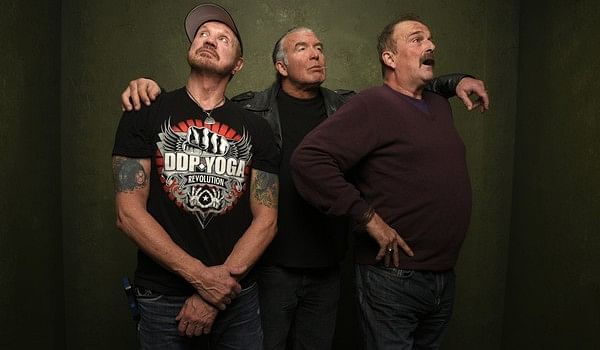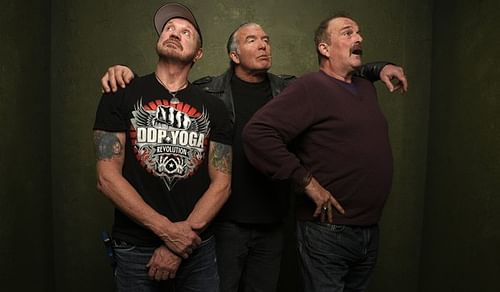
DDP on Hall and Roberts, Jake talks the snake, Hall on being alive

Jake “The Snake” Roberts’ new documentary The Resurrection Of Jake Roberts is now playing in select theaters across the country. The film includes cameos from “Stone Cold” Steve Austin, Dustin “Goldust” Runnels, “Mean” Gene Okerlund, and the “Million Dollar Man” Ted DiBiase, but the central characters to the story are Diamond Dallas Page, Scott Hall, and Roberts.
60-year-old Roberts, is one of the greatest wrestlers of all time. His work in the ring was mesmerizing, as the 6'6" inch monster, billed from Stone Mountain, Georgia, was naturally gifted in the ring. His profound-but-dark interviews were also a major part of his success.The WWE Hall of Famers-Roberts, Hall and DDP recently spoke with Sports Illustrated’s Extra Mustard site to promote Jake’s new documentary. The full interview is at this link. Below are some highlights:
On the snake being a critical piece of Jake’s persona:
Jake acknowledges the fact that he used the snake as something to hide behind. During his life he had carried a lot of shame, but once he had that snake, that was all people wanted to talk about. Everyone was afraid of the snake and also started fearing him. That’s what he wanted.
“If I had a twelve or fifteen-foot snake next to me, chances are you didn’t want to talk about me. The snake was something to hide behind. My biggest problem was all the shame I carried around with me. But when I had that big snake with me, that’s all people ever wanted to talk about. Everyone was scared of the snake, and that’s exactly what I wanted. I didn’t want anyone to get close to me. I wanted everyone to be afraid of me.”, he says
DDP on Jake and Hall now:
DDP states that its been almost two years since Jake turned sober. But he says they went through trying times with Jake messing up six times during his first year. He says his goal with both Scott and Jake was to teach them on how to help themselves. It’s all about cancelling or putting a stop to the negative vibes and replacing them with positive one’s.
“Jake is almost two years sober. Now, when you speak with him, you can have a really intelligent conversation with a really smart guy. But there were times when this really beat me up. That first year when Jake was sober, he messed up maybe six times. He went cold turkey from booze, pills, and crack, but he needed to go completely sober.” he says.
“Scott fell after the movie. But even when the cameras aren’t rolling, we’re still going. So let’s focus on the story you keep telling yourself. I call it ‘self-talk,’ like you talk to yourself. Nobody can pull you down more than you. No one can f— you up more than you. The positive side is nobody can pick you up more than you, but you just need to learn how to do it. So that was my goal with Jake and Scott. Teach them how to help themselves. They’d say, ‘I’m worthless, I’m a piece of s—, I f—– up again,’ and if you keep telling yourself that, then you’re screwed. If you say you can or you say you can’t, you’re right.”
Hall on having a reason to live:
Hall says he was in a dark place and was all broken up, and had arrived at Dallas’s in a wheelchair. He says he had given up hope on everything and seemed to think he had a pretty good run in his life, but it’s over. That’s when DDP interfered and he thanks him for reintroducing me to myself, and restoring hope. He says he has a pretty strong, positive vibe and feels grateful to be alive.
“I was in a dark place and all broken up, and I arrived at Dallas’s in a wheelchair. I thought I’d had a pretty good run and thought it was over. I’d given up hope. But I thank Dallas for reintroducing me to myself, and restoring hope. I have a pretty strong, positive vibe. I feel grateful to be alive, especially when there are so many guys who are gone. I don’t want to sound like a heel, but it’s all about the choices they made. If I could leave anybody with anything, it’s this–if you need help, ask for it. If people offer to help, accept it. Everybody out there knows somebody who suffers from some kind of addiction. There is a lot of stigma to seeking help. I needed to go numerous times to get any kind of results. So I encourage people, if people offer you help, accept it, and if you need help, ask for it.”